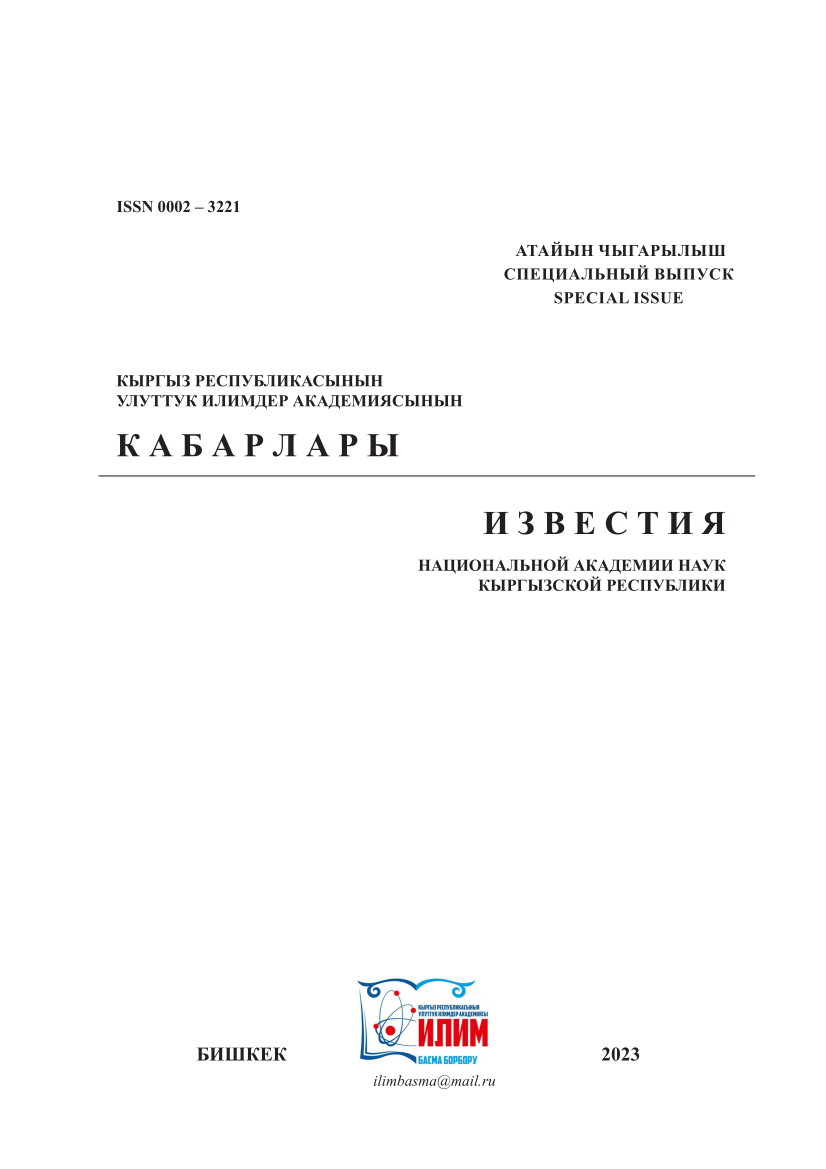PHYTOTESTING OF SOILS CONTAMINATED WITH OIL PRODUCTS UNDER CONDITIONS OF LONG-TERM POLLUTION: ON THE EXAMPLE OF BALYKCHY CITY
Keywords:
oil products, phytotest, microbiological method, soil, sustainable developmentAbstract
The search for express and reliable methods of assessing the ecological state of
ecosystems polluted by xenobiotics is one of the most urgent tasks of scientists of ecologists.
Phytotesting and phytoindication of contaminated ecosystems is one of the promising methods
satisfying the above requirements. Methods of phytotesting of soils contaminated with oil products
is an actual direction in the assessment and remediation of contaminated soils. One of the objects
of scientific interest is oil-contaminated soil in Balykchy city. As a result of leakage from the pipe
of the oil depot in Balykchy, in the late 90s of the last century, about 600 tonnes of oil products got
into the ground. The problem remains actual till today, as no effective measures on cleaning and
restoration of contaminated lands have been taken. It is of scientific interest to study and assess
phytotoxicity of soils contaminated more than 30 years ago and to select optimal phytotest objects,
both sensitive and resistant species.
References
Sinan SS, Shawaludin SN, Jasni J, Azis N, Kadir MZAA, Mohtar MN. Investigation on the
AC breakdown voltage of RBDPO Olein. In: 2014 IEEE Innovative Smart Grid Technologies -
Asia (ISGT ASIA). 2014. p. 760–3.
Sitorus HBH, Beroual A, Setiabudy R, Bismo S. Comparison of streamers characteristics
in jatropha curcas methyl ester oil and mineral oil under lightning impulse voltage. In: 2014 IEEE
th International Conference on Dielectric Liquids (ICDL). 2014. p. 1–4.
Tokunaga J, Koide H, Mogami K, Hikosaka T. Comparative studies on the aging of
thermally upgraded paper insulation in palm fatty acid ester, mineral oil, and natural ester. IEEE
Trans Dielectr Electr Insul. 2016;23(1):258–65.
Mariprasath T, Kirubakaran V. A critical review on the characteristics of alternating liquid
dielectrics and feasibility study on pongamia pinnata oil as liquid dielectrics. Renew Sustain
Energy Rev [Internet]. 2016;65:784–99. Available from: https://www.sciencedirect.com/science/
article/pii/S1364032116303665
Sanderson K, Módenes AN, Espinoza-Quiñones FR, Trigueros DEG, Júnior LAZ, Schuelter
AR, et al. Soybean plant-based toxicity assessment and phytoremediation of soils contaminated by
vegetable and mineral oils used in power electrical transformers. Chemosphere. 2018;197:228–40.
Sorana I.Ţ, Mihăilescu S, Strat D, Gheorghe I.F. Effects of oil pollution on seed germination
and seedling emergence toxicity. Rom Biotechnol Lett. 2020;25(1):1194–201.
Naowasarn S, Leungprasert S. Bioremediation of Oil-contaminated Soil Using Chicken
Manure. Soil Sediment Contam An Int J [Internet]. 2016 Oct 2;25(7):739–56. Available from:
https://doi.org/10.1080/15320383.2016.1213699
Kireeva N.A, Novoselova E.I, Shamaeva A.A, Grigoriadi A.S. Biological activity of
a leached chernozem contaminated with the products of combustion of petroleum gas and its
restoration upon phytoremediation. Eurasian Soil Sci [Internet]. 2009;42(4):458–62. Available
from: https://doi.org/10.1134/S1064229309040139
Kolesnikov SI, Evreinova A V, Kazeev KS, Val’kov VF. Changes in the ecological and
biological properties of ordinary chernozems polluted by heavy metals of the second hazard class
(Mo, Co, Cr, and Ni). Eurasian Soil Sci [Internet]. 2009;42(8):936–42. Available from: https://doi.
org/10.1134/S1064229309080122
Tynybaeva T, Kostina N, Terekhov A, Kurakov A. The microbiological activity and
toxicity of oil-polluted playa solonchaks and filled grounds within the Severnye Buzachi Oil Field
(Kazakhstan). Eurasian Soil Sci. 2008 Jan 10;41:1115–23.
Nikolaeva O V., Terekhova VA. Improvement of laboratory phytotest for the ecological
evaluation of soils. Eurasian Soil Sci. 2017;50(9):1105–14.
Гумерова РХ, Селивановская СЮ, Галицкая ПЮ. Тестирование Отходов, Почв, Материалов С Использованием Живых Систем. 2014;58.
Totubaeva N, Tokpaeva Z, Uulu AA, Kojobaev K. Microbiological diversity and
biotechnological potential of the soil ecosystem of a high-mountainous landfill. Polish J Environ
Stud. 2019;28(6):4429–35.

